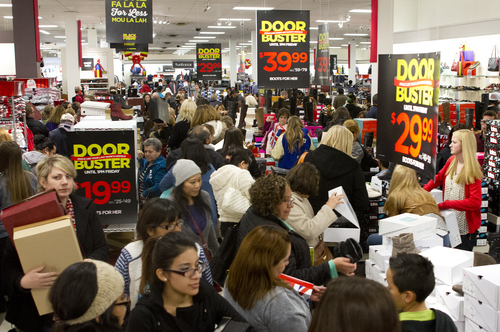This is an archived article that was published on sltrib.com in 2014, and information in the article may be outdated. It is provided only for personal research purposes and may not be reprinted.
Utah continued to have a healthy economy and a growing job market in 2013.
Get ready for an even better 2014.
Economic forecasts from jobs to real estate say the coming year will be even brighter than 2013. Unemployment is expected to drop. The value of homes will continue to rise, and more companies will move into Utah — leading to job growth and a healthier state economy.
"The 2014 outlook is a good one," said Darin Mellott, senior research analyst for commercial real estate services firm CBRE Group, and a member of the Utah Economic Council.
Here's a look at the economic forecast for Utah for 2014, broken down into key areas.
—
Economy/Cost of living • Despite some hiccups last year in the form of sequestration, a government shutdown and the threat that the federal government might default on its loans, Utah's economy purred right along, Mellott said. Now that those threats are behind us, he expects 2014 to be smoother.
"We did experience some softening with the rest of the country [last year]. [But] we're ending the year quite well," he said. "That tells me that businesses are continuing to have confidence in hiring people."
Another indicator of Utah's strong economy is consumer confidence. The latest Zions Bank Consumer Attitude Index (CAI), which surveys 500 Utahns about the economy, reached a record high of 96.1 from November to December of last year. Holiday shopping was strong. More people believed their annual household income would rise in the next six months than the same period the year before, according to the survey, and there was increased optimism over business conditions in Utah and residents' feelings about the value of their homes.
Meanwhile, the cost of living in Utah remains relatively low compared to the rest of the country, and Mellott expects that to remain so during 2014.
"The cost of doing business in the state is very low," he said. "Inflation will stay in check over the next 12 months. I don't expect anything dramatic as far as that goes."
—
Jobs/Employment • As the economy rebounds, so does the job market. After hurdles with the government shutdown and raising the debt ceiling, more businesses are now beginning to invest in their companies again, which means more jobs, said Carrie Mayne, chief economist for the Utah Division of Workforce Services.
Last November, the state unemployment rate was at 4.3 percent. This year, it's expected to drop to 4.2 percent (the national unemployment rate is around 7 percent). Last November, the number of filled jobs in Utah grew 2.2 percent. That could reach 3.1 percent growth this year. The average annual payroll wage for a Utahn should rise from $41,000 per year to about $42,200 per year. And the percentage of Utahns over 16 years old who have a job or who are actively looking for a job should rise to 68.5 percent of the state's population in 2014.
"A lot of signs show that people are coming back," Mayne said. "We think that there's a lot of pent-up demand, and businesses have been slightly reluctant to really move forward in investing. But now, businesses feel a little more confident, their expectations are a little more clear."
—
Real estate • Last year was an explosive one for Utah homes. The price of a house skyrocketed 14.5 percent in 2013 from the year before, another indicator that the economy is growing in Utah.
"Things were so affordable that people said, 'I have to buy,' " said Ryan Kirkham, vice president of the Utah Association of Realtors. "The interest rates, the job growth, the affordability all pushed the prices up."
Will the same buying frenzy happen this year? Not likely, Kirkham said. In addition to the higher cost of homes, interest rates will likely rise in 2014 from about 4.5 percent on a 30-year mortgage to 5 percent.
Consequently, the supply of available homes for sale will get bigger, closer to the kind of equilibrium that's good for the real estate market, he said, and the rise in home prices will more likely be between 3 percent and 7 percent in 2014, not the 14.5 percent of last year.
"Next year I think we're expecting a little more balance — a healthy, stable market — which I personally like," he said.
—
Investments • There's no question that 2013 was a banner year for the U.S. stock market with more than 20 percent growth on most portfolios. That's because the market is generally a forward-looking indicator of the economy, said Matt Johnson, managing director of Zions Wealth Advisors, and it was predicting that 2014 was going to be a healthy year.
This year, however, expectations on the stock market's performance will be lower, he said. It will be more like single-digit growth. "The market has already rallied based on those expectations ... for 2014," he said. "So things need to work out even better than what people have expected."
As far as particular sectors that might see good results this coming year, Johnson thinks global companies will do well now that areas like Europe are finally coming out of a recession. Emerging markets that have not rallied before in areas such as in Brazil, China and India could become more attractive, he added.
Still, the key word in investment strategy is the same as it's always has been: diversification. Johnson said stay smart, spread the risk evenly, and don't be shocked by economic news reports and overreact.
"A lot of things are just noise," he said about economic news that may affect your decisions. "It's almost better to not pay attention to the noise. Have a plan in place that makes sense, and have proper diversification. Don't get swayed by the news of the day."











